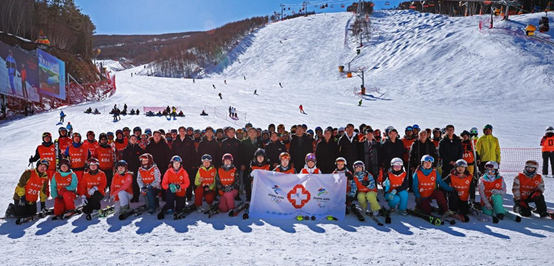Beijing Winter Olympic Games a hot topic at two sessions
By Bai Yang from People’s Daily
The preparation of the Beijing 2022 Winter Olympic Games has become a hot topic among national legislators and top political advisors during China’s ongoing “”two sessions”, as China steps up efforts to present the world a feast of winter sports.
The Beijing Winter Olympic Games, scheduled to take place from 4 to 20 February, 2022 in Beijing and its neighboring Zhangjiakou, will be the first Winter Olympic Games ever held by China.
“We divided the preparation work in five phases, and are currently going through the second one –individual program planning,” said Wang Yanxia, member of the 13th National Committee of the Chinese People’s Political Consultative Conference (CPPCC), at a group meeting of the second session of the country’s top political advisory body. The preparation will move on to the third phase of testing events this year, she added.
Wang, who is also the deputy director of the Sports Department of the Beijing Organizing Committee for the 2022 Olympic and Paralympic Winter Games, detailed the preparations of the Games at the meeting, introducing that they are making steady progress in venue construction, personnel training, technology support, market development, meteorological guarantee, and volunteer services.
The Organizing Committee has subdivided 55 items of all preparation work into 3,158 specific tasks. So far, the venue construction has been fully started, and most of the venues will meet the requirements of the testing events the next year.
The Alpine Skiing World Cup, as the first test match for the 2022 Winter Olympics, will be held in Yanqing in February 2020, said Shen Jin, member of the CPPCC and deputy director of the Venue Planning and Construction Department of the Organising Committee. “It’ll be an arduous task as the championship is about to kick off in less than a year,” Shen noted.
Shen said that the National Alpine Skiing Center is set to meet the trial event requirements by the end of October this year and all the other competition venues will be completed and ready for trial events next year.
The Beijing-Zhangjiakou High Speed Railway and Yanchong Expressway linking Yanqing District and Chongli District of Zhangjiakou are also expected to open this year, she added.
The wide application of smart and intelligent technologies in the venues will be a major highlight. The National Speed Skating Oval, the only new venue built in Beijing for the event, will provide athletes with a digital system for timing and speed measurement, and provide spectators with intelligent seat guidance and analysis for real-time event.
Telecom giant and internet service provider of the Games China Unicom announced last December that it would invest over 1.5 billion yuan ($217 million) to upgrade its communicating services and build a 5G-based broadband network, in a bid to create a smart operation guarantee system, provide ultimate user experience, high-quality event services and intelligent venue operations.
Competitions are a key factor for the success of the Winter Olympic Games, and snow events are full of uncertainties due to the weathers. In order to ensure meteorological guarantee, the Organizing Committee signed an agreement with China Meteorological Administration (CMA) to set up a meteorological service center.
A chief meteorological officer was appointed and 52 weather forecasters were transferred from the CMA to establish a forecasting team. Every venue of the Games will be stationed with one full-time forecaster.
The weather forecast during the Games will be accurate to every 100 meters, which will also be updated in minutes, said Zhang Jiandong, vice mayor of Beijing and executive vice president of the Organizing Committee.
According to Zhang, also a deputy to the 13th National People’s Congress (NPC), the CMA’s meteorological forecasting team is conducting drills and tests in accordance with the requirements of the International Olympic Committee to update meteorological information of every 100 meters in every 10 minutes.

Thomas Bach, president of the International Olympic Committee, inspects preparation progress of the Beijing 2022 Winter Olympic Games in Zhangjiakou, north China’s Hebei Province, and Beijing’s Yanqing District, January 29, 2019. (Photo by Zhang Chenlin / official website of the Beijing Organizing Committee for the 2022 Olympic and Paralympic Winter Games)
Thomas Bach, president of the International Olympic Committee, inspects preparation progress of the Beijing 2022 Winter Olympic Games in Zhangjiakou, north China’s Hebei Province, and Beijing’s Yanqing District, January 29, 2019. (Photo by Zhang Chenlin / official website of the Beijing Organizing Committee for the 2022 Olympic and Paralympic Winter Games)
The photo shows the beautiful scenery of snow-capped mountain in the Chongli competition area of the Beijing 2022 Winter Olympic Games, September 29, 2018 (Photo by Du Baihua / official website of the Beijing Organizing Committee for the 2022 Olympic and Paralympic Winter Games)

The Games Services Department of the Beijing Organizing Committee for the 2022 Olympic and Paralympic Winter Games holds the launching ceremony of an intensive skiing training for medical personnel for the Beijing Winter Olympics, February 21, 2019. A medical support team was officially established at the ceremony. (Photo/the official website of the Beijing Organizing Committee for the 2022 Olympic and Paralympic Winter Games)
The 2018/2019 International Ski Federation (FIS) Freestyle Ski World Cup was held in Chongli District, Zhangjiakou, north China’s Hebei Province on December 15 and 16, 2018. It was the third consecutive event of the FIS Freestyle Ski World Cup, a top level skiing event, held in the city. (Photo/the official website of the Beijing Organizing Committee for the 2022 Olympic and Paralympic Winter Games)












